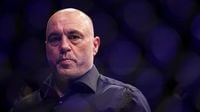In a recent episode of "The Joe Rogan Experience," journalist and author Douglas Murray engaged in a heated discussion regarding his new book, On Democracies and Death Cults, which presents a pro-Israel perspective on the complex Israel-Hamas-Palestine conflict. The episode featured comedian Dave Smith, known for his increasingly anti-Israel rhetoric, which added to the tension of the conversation. Murray did not hold back, calling out the growing number of anti-Israel voices that Rogan has platformed, including figures like Darryl Cooper and Ian Carroll.
Murray's appearance was marked by a vigorous exchange, particularly as he confronted Rogan about the implications of hosting guests who propagate what he considers dangerous and revisionist narratives. "I feel you’ve opened the door to quite a lot of people who now got a big platform, who have been throwing out counter-historical stuff of a very dangerous kind," Murray asserted, highlighting his concerns about the potential impact of such discussions.
The podcast has gained a massive following, with Rogan boasting around 15 million listeners on Spotify and millions more tuning in through other platforms. This level of influence raises significant questions about the responsibility of those who host controversial figures. Murray emphasized that many of these guests, including Cooper and Carroll, lack the historical expertise necessary to engage in meaningful dialogue about such critical issues.
One of the most contentious points in the discussion arose when Murray referred to Darryl Cooper's previous comments on Tucker Carlson's show, where Cooper labeled Winston Churchill as the "chief villain of World War II." Murray underscored the absurdity of such claims, stating, "It’s pretty hard to listen to somebody who says, ‘I don’t know what I’m talking about, but now I’m going to talk,’ or: ‘I don’t know about this.’" This critique of the "just asking questions" narrative often employed by Rogan and his guests reflects a broader concern about the normalization of fringe ideas.
During the podcast, Murray also addressed the troubling implications of Smith's and Cooper's remarks, which often blur the line between humor and harmful ideology. For instance, Cooper has previously suggested that the Nazis did not intend to kill Jews in concentration camps, a statement that drew backlash and was labeled as hyperbolic trolling. Despite Cooper's attempts to walk back his comments, Murray argued that such rhetoric contributes to a dangerous discourse that minimizes historical atrocities.
Moreover, Ian Carroll's contributions to the podcast were equally alarming. He insinuated connections between Jeffrey Epstein, Israel, organized crime, and "global Jewish billionaires," a narrative that echoes longstanding antisemitic tropes. This kind of discourse raises questions about the role of platforms like Rogan's in shaping public perception and promoting harmful conspiracy theories.
Rogan, for his part, defended his approach by stating, "I don’t think about it that way. I just think, ‘I’d like to talk to that person.'" This dismissal of the potential consequences of his platforming choices has drawn criticism from various commentators, including Murray, who argued that the responsibility to challenge dangerous narratives is paramount.
The episode's fallout has been significant, with commentators divided on the implications of Murray's critiques. Some have praised him for standing up against what they see as a troubling trend in alternative media, while others have accused him of being out of touch with the podcast's audience. Notably, even former President Donald Trump expressed support for Murray, promoting his book on social media amidst the controversy.
As Murray continues to navigate the aftermath of his appearance, he remains steadfast in his belief that the rise of conspiracy theories and revisionist histories is not merely a passing phase but a growing threat. He remarked, "There’s a point at which ‘I’m just raising questions’ isn’t valid anymore. You’re not asking questions — you’re telling people something." This sentiment underscores the need for a more rigorous standard of truth in public discourse.
The implications of this debate extend beyond the podcast itself, reflecting broader societal concerns about the influence of alternative media and the responsibility of its figures. With platforms like Rogan's reaching audiences that rival traditional media outlets, the stakes have never been higher.
In conclusion, as Douglas Murray and others continue to engage in these critical discussions, the need for accountability and expertise in public discourse becomes increasingly apparent. The challenge remains: how to balance the freedom of expression with the imperative to uphold historical truths and prevent the spread of dangerous ideologies.




